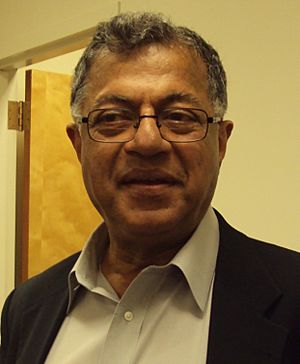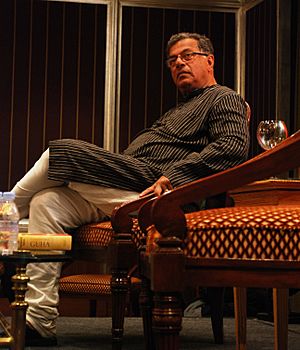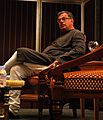Girish Karnad facts for kids
Quick facts for kids
Girish Karnad
|
|
|---|---|

Girish Karnad at Cornell University, 2009
|
|
| Born | Girish Raghunath Karnad 19 May 1938 Matheran, Bombay Presidency, British India (now in Maharashtra, India) |
| Died | 10 June 2019 (aged 81) Bengaluru, Karnataka, India |
| Occupation |
|
| Alma mater | Karnataka University Magdalen College, Oxford |
| Period | 1961–2019 |
| Genre | Fiction |
| Literary movement | Navya |
| Notable works | Tughlaq Taledanda |
| Spouse | Dr Saraswathy Ganapathy |
| Children | Raghu Karnad, Shalmali Radha |
Girish Karnad (born May 19, 1938 – died June 10, 2019) was a famous Indian actor, film director, and writer. He was especially known for his plays written in the Kannada language. He also worked a lot in South Indian cinema and Bollywood, which is the Hindi film industry.
Girish Karnad was a very important playwright in India during the 1960s. He helped shape modern Indian plays, just like other famous writers in different languages. He won the Jnanpith Award in 1998, which is the highest award for literature in India.
For about 40 years, Karnad wrote plays that often used stories from history and old myths. He used these old tales to talk about problems and ideas happening in modern times. He translated his own plays into English, and they were very popular. Many of his plays were also translated into other Indian languages and performed by famous directors.
He was also very active in Indian cinema as an actor, director, and screenwriter. He won many awards for his work in both Hindi and Kannada films. The Indian government honored him with the Padma Shri and Padma Bhushan awards. He also won four Filmfare Awards for his film work.
Contents
Growing Up and Learning
Girish Karnad was born in 1938 in a place called Matheran, which is now in Maharashtra, India. His mother, Krishnabai, was a nurse and housekeeper. His father, Raghunath Karnad, was a doctor. Girish was the third of their four children.
He first went to school where they spoke Marathi. Later, his family moved to Sirsi, where people spoke Kannada. Here, young Girish saw many traveling theatre groups. He loved watching traditional plays like Yakshagana. When he was 14, his family moved to Dharwad, Karnataka.
He studied mathematics and statistics at Karnataka Arts College in Dharwad and earned his degree in 1958. After that, he went to England. He studied Philosophy, Politics, and Economics at Magdalen College at the University of Oxford from 1960 to 1963. He was a special student called a Rhodes Scholar. While at Oxford, he was even elected the President of the Oxford Union in 1962–63.
His Amazing Career
After finishing his studies, Girish Karnad worked for Oxford University Press in Chennai for seven years. But he loved writing so much that he decided to become a full-time writer in 1970. While in Chennai, he also joined a local theatre group called The Madras Players.
In the late 1980s, he was a visiting professor at the University of Chicago in the USA. During this time, one of his plays, Nagamandala, was performed for the first time in Minneapolis. This play was based on his own English translation of his Kannada original.
Karnad also held important positions in the arts. He was the director of the Film and Television Institute of India from 1974 to 1975. He also led the Sangeet Natak Akademi, which is India's national academy for performing arts, from 1988 to 1993. From 2000 to 2003, he worked as the director of the Nehru Centre in London, which promotes Indian culture.
His Plays and Writings
Girish Karnad is most famous for his plays. He wrote them in Kannada, his favorite language. He often translated his own plays into English. Many of his plays were also translated into other Indian languages.
When Karnad started writing, Kannada literature was very much inspired by Western writing. But he found a new way to tell stories. He used old Indian history and myths to talk about modern problems and feelings.
One of his first plays was Yayati, published in 1961 when he was just 23. It was based on a story from the ancient Indian epic, the Mahabharata. The play became very popular and was performed in many languages.
His next play, Tughlaq (1964), was about a king from the 14th century, Muhammad bin Tughluq. This play was a way to talk about the hopes and disappointments of India's early years after independence. It made Karnad, at 26, a very important playwright in the country. This play was performed in famous places like the Purana Qila in Delhi.
Hayavadana (1971) was another famous play. It used a folk theatre style called Yakshagana. Naga-Mandala (Play with Cobra, 1988) was based on a folk tale. It won him an award for being a very creative work.
His Work in Movies
Girish Karnad started his film career in 1970 with the Kannada movie Samskara. He acted in it and also helped write the script. This movie won a big award for Kannada cinema.
On television, he played Swami's father in the popular TV series Malgudi Days (1986–1987). He also hosted a science show called Turning Point on Doordarshan in the early 1990s.
He directed his first movie, Vamsha Vriksha, in 1971. He won an award for Best Direction for this film. Karnad directed many movies in Kannada and Hindi, such as Godhuli (1977) and Utsav (1984). He also made documentaries about poets and cultural movements. Many of his films and documentaries won national and international awards.
Some of his well-known Kannada movies include Tabbaliyu Neenade Magane, Ondanondu Kaladalli, and Kaadu. His Hindi movies include Nishaant (1975), Manthan (1976), and Pukar (2000). He also acted in popular films like Iqbal (2005), Dor (2006), Ek Tha Tiger (2012), and Tiger Zinda Hai (2017).
Other Contributions
Girish Karnad also lent his voice to the audiobook of former Indian President A. P. J. Abdul Kalam's autobiography, Wings of Fire.
Awards and Recognitions
Girish Karnad received many awards and honors for his work in literature and cinema.
For Literature
- Rajyotsava Award – 1970
- Sangeet Natak Akademi award – 1972
- Padma Shri – 1974
- Padma Bhushan – 1992
- Sahitya Academy award – 1994
- Jnanapith Award – 1998
- Kalidas Samman – 1998
- Honorary doctorate by University of Southern California, Los Angeles – 2011
For Cinema
He won several National Film Awards and Filmfare Awards for his acting, directing, and screenwriting.
- National Film Awards:
- 1971: Best Direction for Vamsha Vriksha
- 1971: Best Feature Film in Kannada for Vamsha Vriksha
- 1973: Second Best Feature Film for Kaadu
- 1978: Best Screenplay for Bhumika
- 1989: Best Non-Feature Film for Kanaka Purandara
- 1999: Best Feature Film in Kannada for Kaanuru Heggadathi
- Filmfare Awards South:
- 1972: Best Director – Kannada for Vamsha Vriksha
- 1974: Best Director – Kannada for Kaadu
- 1978: Best Director – Kannada for Ondanondu Kaladalli
- Filmfare Awards Hindi:
- 1980: Best Screenplay for Godhuli
- Karnataka State Film Awards:
- 1971-72: First Best Film for Vamsha Vriksha
- 1971-72: Best Dialogue Writer for Vamsha Vriksha
- 1989-90: Best Supporting Actor for Santha Shishunala Sharifa
Personal Life
Girish Karnad met his wife, Saraswathi Ganapathy, in Chennai. They got married ten years later when he was 42 years old. Saraswathi's mother was Parsi and her father was from the Kodava community. Girish and Saraswathi had two children and lived in Bangalore.
His Beliefs and Activism
Girish Karnad strongly believed in different cultures living together peacefully and in freedom of speech. He often spoke out against religious extremism. For example, he condemned the destruction of the Babri Masjid in 1992. He also spoke against political parties like the RSS and BJP on several occasions.
He was a supporter of harmony among different communities. In 2019, he wore a sign that said "Me Too Urban Naxal" to show support for a journalist who had been killed. He also spoke about Tipu Sultan, a historical king, saying he was one of the greatest kings in Karnataka's history.
His Passing
Girish Karnad passed away on June 10, 2019, in Bengaluru at the age of 81. He had been ill for a long time and died due to multiple organ failure. His family respected his wish for a simple funeral without any grand ceremonies or visits from important people.
Movies He Acted In
| Year | Title | Role | Language |
|---|---|---|---|
| 1970 | Samskara | Praneshacharya | Kannada |
| 1971 | Vamsha Vriksha | Raju (lecturer) | Kannada |
| 1975 | Nishaant | Schoolmaster | Hindi |
| 1976 | Manthan | Dr. Rao | Hindi |
| 1977 | Swami | Ghanshyam | Hindi |
| 1980 | Aasha | Deepak | Hindi |
| 1982 | Umbartha | Advocate Subhash Mahajan | Marathi |
| 1983 | Ananda Bhairavi | Narayana Sarma |
|
| 1985 | Meri Jung | Deepak Verma | Hindi |
| 1986 | Neela Kurinji Poothappol | Appu Menon | Malayalam |
| 1990 | Santha Shishunala Sharifa | Govindabhatta | Kannada |
| 1991 | Gunaa | Dr. Ganesh | Tamil |
| 1994 | Kadhalan | Kakarla Satyanarayana Murti (Governor of Tamil Nadu) |
Tamil |
| 1995 | Sangeetha Sagara Ganayogi Panchakshara Gavai | Hanagal Kumaraswamiji | Kannada |
| 1997 | Minsaara Kanavu | Amal Raj | Tamil |
| 1998 | China Gate | Sunder Rajan (Forest Officer) |
Hindi |
| 1999 | Kanooru Heggadithi | Chandregowda | Kannada |
| 1999 | AK-47 | Jagannath Rao | Kannada |
| 2000 | Pukar | Mr. Rajvansh | Hindi |
| 2000 | Hey Ram | Uppilli Iyengar | Tamil |
| 2005 | Iqbal | Guruji | Hindi |
| 2006 | Dor | Randhir Singh | Hindi |
| 2007 | Aa Dinagalu | Girish Nayak | Kannada |
| 2012 | Ek Tha Tiger | Dr. Shenoy (RAW Chief) |
Hindi |
| 2012 | Mugamoodi | Lee's Grandfather | Tamil |
| 2016 | 24 | Sathya's Grandfather | Tamil |
| 2017 | Tiger Zinda Hai | Dr. Shenoy (RAW Chief) |
Hindi |
Movies He Directed
- Vamsha Vriksha (1971, Kannada)
- Kaadu (1973, Kannada)
- Tabbaliyu Neenade Magane (1977, Kannada)
- Godhuli (1977, Hindi)
- Ondanondu Kaladalli (1978, Kannada)
- Utsav (1984, Hindi)
- Cheluvi (1992, Kannada and Hindi (dubbed))
- Kanooru Heggadithi (1999, Kannada)
Images for kids
 | Janet Taylor Pickett |
 | Synthia Saint James |
 | Howardena Pindell |
 | Faith Ringgold |




